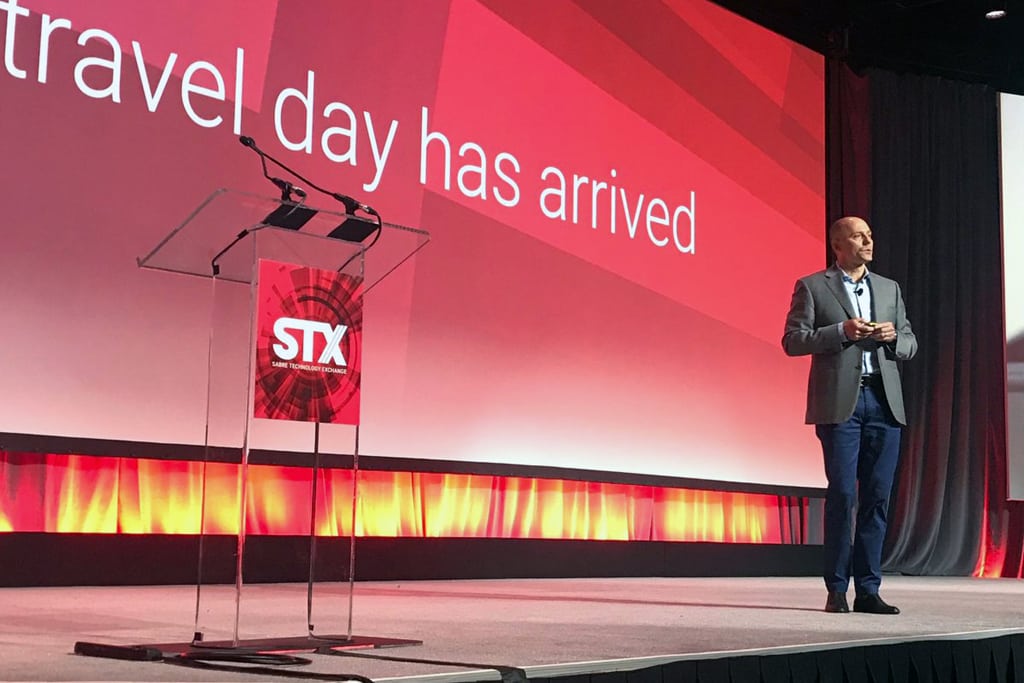Sabre Doubles Down on Hotel Management Software

Skift Take
Sabre, a Texas-based travel technology company, said Tuesday it had launched a new property management system to complement its enterprise software solutions for hoteliers.
The news is significant on two fronts. The leader worldwide in sales of property management systems, especially with upscale hotels, is Oracle Hospitality.
Dallas-based Sabre presents a potential rival, given that it already has customers at 39,000 properties worldwide using its enterprise software for a variety of services, such as its central reservation system and its booking engine for hotel websites.
The news is also notable as it is a large plank in Sabre CEO Sean Menke's effort to rebalance the company away from its dependence on serving airline customers to other parts of the industry.
Sabre's property management system, called SynXis Property Hub, runs on the cloud, meaning it's delivered via the internet instead of by on-property servers. Conventional wisdom in the trade is that this method offers companies the ability to offer more flexible services and integrations.
Oracle Hospitality has been offering hoteliers many services by the cloud. But there have been hiccups. Early this year it had to move hoteliers in some Asia Pacific markets off its cloud service and back to its old server-based model for an indefinite period as it attempts to solve glitches, sources said.
While Sabre has had a very basic property management tool being used by about 4,000 properties, the new Property Hub is its first significant foray.
Wins and Losses
The Sabre Hospitality Solutions unit has seen wins and losses. On the plus side, it has a significant lead over peer global software rivals like Amadeus and Shiji in getting traction with a wide range of services with the most number of properties.
But it has stumbled, too. Last year it announced that Radisson Hotel Group, a 1,400-hotel group headquartered in Brussels and just rebranded from Carlson Rezidor, had tapped it to build a bespoke digital platform to power its e-commerce business for all of its brands.
But the hotel group Tuesday that it has instead opted to build its solution in-house instead. Spokespeople for the company declined to explain why the Sabre deal fell through.
Sabre's arch-rival Amadeus, the Madrid-based technology company that is also trying to rebalance away from serving primarily airline customers, is also making a big push into hospitality services. Amadeus continues to work on bringing InterContinental Hotels Group into production as the launch partner of its new guest reservation system.
Last year Amadeus also signed Premier Inn, a UK-based hotel chain, as a user of its central reservation system, property management system, and its payment system across the group's more than 750 properties.
Oracle needs to eye the competition from Sabre and Amadeus carefully, though they are still significantly behind it in market share, according to the Skift Research's report "The Strategic Guide to a Modern Hotel Technology Stack."
Taking a veiled shot at Oracle, Clinton Anderson, president of Sabre Hospitality Solutions, said: "It’s clear that guests expect a personalized experience across devices and touchpoints. Providing this has proven to be a challenge for properties using legacy, disparate systems for hotel distribution and property management."
He will presumably be hoping that current hotel user of the SynXis Central Reservations system will upgrade to the property management system to have a more seamlessly unified picture of guest profile data from guests who book directly with the property. In theory, this functional enables hotel workers using mobile tablets to upsell guests to other services across properties and guest stays.
One headwind for Sabre is the training problem. Because Oracle Hospitality's Micros system is the industry-leading tool, most hotel workers have already been trained on how to use it at some point in their careers. That widespread adoption makes it easy for hotels to hire staff and get them trained quickly, such as when working at hotel front desks.
Customer Relationship Data At Long Last
Sabre also said Tuesday it plans to roll out SynXis Guest Experience, nicknamed GX, a service that will unify guest preferences and digital booking behavior across all of the company's systems.
The first hotel customers will be using the system by the end of this year, said Mike Rodger, vice president guest experience and property management at Sabre Hospitality and who came over a year ago from having managed the technology systems at Four Seasons.
"We used to talk a lot at Four Seasons about context," Rodger said. "Meaning, how to greet and interact with guests relevant to whether they're staying for, say, a board meeting or a sports game or a funeral."
"The new GX product is not just about knowing more about an individual guest to be able to provide a more relevant message or offer," Rodger said. "It's also about providing the human servicing the guest have some insight into how to treat the guest relevant at all relevant touch points, so the front desk and the worker in the spa all have relevant information."
Cendyn, a customer relationship management technology provider based in Florida, will power this service.
"This technology will let the first experience a guest has at a hotel after a harried trip is on par with the humane service they had elsewhere on their trip, like when an Uber or black car driver greeted them by name," said Tim Sullivan, Cendyn's chief sales and marketing officer.
The Sabre integration is arguably the biggest win yet for two-decade-old company, which took on a minority investment from private equity firm Accel-KKR in 2016 to spearhead growth. It may have about 5 percent of the market, and yet is one of the better known players.
The move is implicitly a loss for TravelClick, a New York-based hotel technology provider that has positioned itself as a leader in providing customer relationship systems and which in 2014 was acquired by private equity firm Thoma Bravo for $930 million.
Rodger expected the earliest adopters would be upscale brands.
Some critics noted that hotels have to be using all of the Sabre systems to get access to the unified customer profiles and that the company has not yet released ways that are more flexible of accessing it, such as via an API (application programming interface, or a method used for retrieving data).
Missing Pieces and Additional Services
Once Sabre has a customer relationship management offering, too, the one big piece that will be missing will arguably be revenue management software. The company plans to offer integrations with third-party providers.
A case in point: A spokesperson for IDeaS, the largest revenue management solution provider for hotels in the U.S., said Tuesday that the two companies had met to discuss potential future integrations of revenue management services, such as "adapting pricing based on the attributes being shopped by the guest rather than traditional room-type coding constraints and adjusting pricing by considering purchase intent and presumed price sensitivity for different types of trips."
Earlier in 2018, Sabre launched a new platform for lodging inventory to give agents more options than consumers and corporate travelers would be able to find on their own.
"The new lodging solution will give travel buyers access to more than 900,000 hotel choices from other providers, via Sabre," said Traci Mercer, senior vice president of lodging, ground, and sea for Sabre Travel Network.
Providers include Hotelbeds (and its partner brand GTA), the largest distributor of rooms at wholesale rates, and Expedia Affiliate Network, where the online travel agency shares its hotel inventory with third-parties.
Sabre will be seeking to add more inventory from the mini-Hotelbeds of the world, meaning aggregators that specialize in regional content or in specialized content, like alternative lodging from a supplier like, theoretically, Airbnb or corporate serviced apartments content from a supplier like, theoretically, BridgeStreet, Mercer said.





